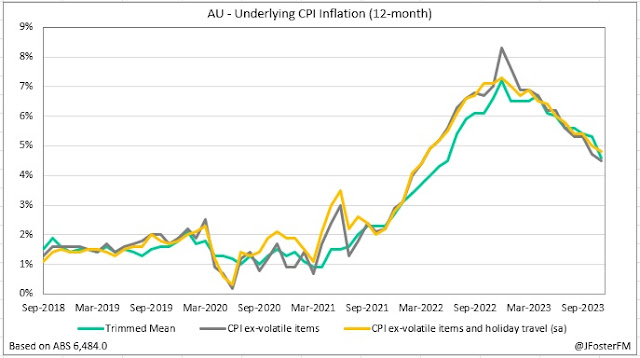Australia's 12-month headline inflation rate fell to its lowest since January 2022, slowing to 4.3% in November (vs 4.4% expected) from 4.9% in October. Falling fuel prices drove the decline and government subsidies continue to keep much larger price rises for electricity and rents at bay. Confirmation of an easing in price pressures for a range of household services was reflected in a cooling in the measures of underlying inflation. The RBA last raised the cash rate (4.35%) at the November meeting and today's report suggests monetary policy will remain unchanged in February.
Headline inflation continues to slow with the disinflationary impulse from overseas still working its way through to Australia. At 4.3% in November, 12-month inflation in Australia has eased to a 22-month low and has halved from its peak (8.4%) at the end of 2022. On a 6-month annualised basis, headline inflation was tracking at a 4.2% rate; however, it is substantially slower at 2.3% in 3-month annualised terms.
Disinflation in many countries accelerated into year-end and this looks very likely to also be the case for Australia. This should be confirmed in the full quarterly CPI report for Q4, due to be published at the end of the month.
The underlying inflation measures remain on a downward trend; however, they are higher than the headline rate. The trimmed mean eased from 5.3% to 4.6%; CPI excluding volatile items softened from 4.7% to 4.5% and CPI excluding volatile items and holiday travel (in seasonally adjusted terms) declined from 5% to 4.8%.
Reflecting the disinflationary impulse from overseas - in large part due to the declines in petrol prices - tradables inflation has slowed substantially to 1.6%. That compares with inflation of 5.7% in the more domestically driven (and services-based) non-tradables category.
This particular release included updates on many services prices. Overall, services inflation eased from 5% to 4.7%, still elevated but cooling a 12-month low nonetheless. By contrast, goods inflation has fallen to a 2-year low at 4%.
Notable price movements in the services category included holiday travel and accommodation falling from 1.3% to -0.3%, while the government's assistance package capped rent inflation at 7.1% (from 6.6% in October) from what the ABS reported would have otherwise been an 8.8% rise.
Goods inflation slowed on the back of falling petrol prices (-0.5%m/m), declining from 8.6% to 2.3% at an annual rate. Food inflation eased from 5.3% to 4.6%. Rises in electricity prices were contained to 10.7% (from 10.1%), with government rebates preventing much steeper rises from being passed through to households over the back half of the year.








